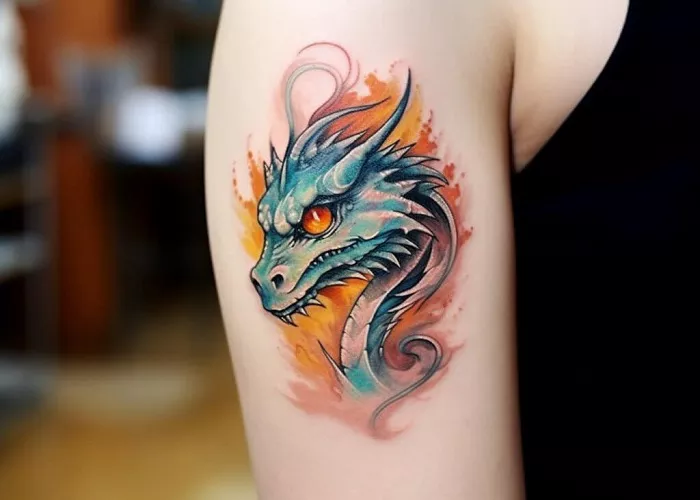Tattoos have been an integral part of human culture for centuries, serving as a canvas for self – expression, cultural representation, and personal stories. Among the vast array of tattoo designs, the dragon tattoo holds a particularly prominent and captivating place. Dragons have roamed the mythologies, legends, and folklore of numerous civilizations across the globe, making their mark not only in stories but also on the skin of those who choose to adorn themselves with this powerful symbol. In this exploration, we will delve into the rich significance of dragon tattoos, uncovering the multiple layers of meaning they carry.
The Dragon in Mythology and Culture
Eastern Dragons: Symbols of Power and Prosperity
In Eastern cultures, especially in China, Japan, and Korea, the dragon is revered as a symbol of imperial power, good luck, and prosperity. In Chinese mythology, the dragon is one of the most auspicious creatures. It is often depicted as a long, serpentine creature with claws, horns, and the ability to control water, clouds, and rain. Emperors in ancient China were often associated with the dragon, representing their divine right to rule. A dragon tattoo for someone with roots in or an affinity for Eastern cultures can signify a connection to their heritage, a desire for good fortune in life, or an aspiration for power and success in a positive, harmonious sense.
Western Dragons: Monsters or Guardians?
In Western cultures, dragons have a more complex reputation. In medieval European folklore, dragons were often portrayed as fearsome beasts, hoarding treasure in dark caves and terrorizing villages. They represented chaos and the unknown. However, not all Western dragons were villains. Saint George, a Christian martyr, is famous for slaying a dragon, which came to symbolize the triumph of good over evil. A Western – inspired dragon tattoo might thus represent a personal struggle against inner demons, a battle for justice, or a sense of standing up against the odds.
Personal Significance of Dragon Tattoos
Strength and Courage
One of the most common reasons people get dragon tattoos is to symbolize strength and courage. Dragons, regardless of cultural origin, are powerful creatures. Their ability to breathe fire (in many legends), fly through the skies, and command elements makes them a natural symbol for those who want to embody these qualities. For someone who has overcome great challenges in life, such as a serious illness or a difficult personal situation, a dragon tattoo can be a permanent reminder of their inner strength and the courage it took to persevere.
Freedom and Independence
Dragons are often depicted as free – spirited creatures, unbound by the constraints of the earth. They soar through the air, answer to no one, and live in remote, mysterious places. A dragon tattoo can thus represent a person’s longing for freedom, whether it’s freedom from a restrictive job, a toxic relationship, or societal expectations. It can be a statement of one’s independent nature and a refusal to be tied down.
Protection
In some cultures, dragons are seen as protectors. They guard treasure, sacred places, or even entire kingdoms. People who get dragon tattoos may do so with the belief that the dragon will watch over them, protecting them from harm. This could be both physical protection, such as in dangerous occupations, or emotional and spiritual protection, warding off negative energies and bad luck.
Design Elements and Their Meanings
Color of the Dragon
The color of a dragon tattoo can add another layer of meaning. In Eastern cultures, a golden dragon is associated with the highest level of imperial power and extreme good luck. A green dragon might symbolize growth, harmony with nature, and fertility. In Western designs, a red – colored dragon, with its association to fire, could represent passion, anger, or danger. A black dragon might be linked to mystery, darkness, and a more menacing presence.
Dragon Posture and Expression
The way the dragon is depicted also matters. A coiled dragon may symbolize latent power, a force waiting to be unleashed. It could represent a person who is biding their time, gathering strength for a future endeavor. A flying dragon, on the other hand, conveys a sense of freedom, progress, and the ability to rise above challenges. A dragon with an open mouth, breathing fire, can be a symbol of aggression, standing up for oneself, or the release of pent – up emotions.
Conclusion
In conclusion, the significance of a dragon tattoo is as diverse as the cultures that have given rise to the dragon legends and the individuals who choose to wear this symbol on their skin. Whether it is a connection to one’s heritage, a representation of personal qualities like strength and courage, or a symbol of protection and freedom, the dragon tattoo holds a special place in the world of body art. It serves as a powerful visual statement, a storyteller of one’s past, present, and future aspirations. As more people continue to get dragon tattoos, they carry forward the rich tapestry of meanings associated with this mythical creature, adding their own unique chapters to the ongoing saga of the dragon’s significance.
Related topics:

